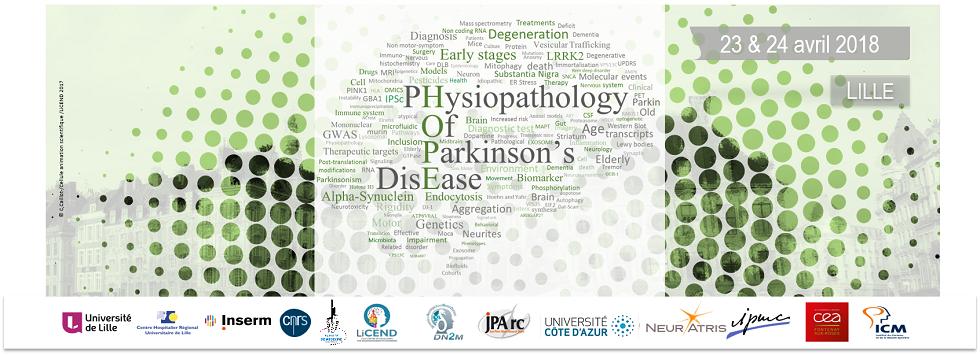Jean-Marc Taymans (1), Eugenie Mutez (1,2), William Sibran (1), Laurine Vandewynckel (1), Thomas Comptdaer (1), Pierre Semaille (1), Matthieu Drouyer (1), Guillaume Baille (2), Severine Bleuse (1,2), Luc Defebvre (2), Alain Destée (1,2), Marie-Christine Chartier-Harlin (1)
(1) Univ. Lille, Inserm, CHU, UMR-S 1172, JPArc Neurosciences and Cancer, Lille, France, F-59000
(2) Movement Disorders Department, University Hospital, Lille, France, F-59000.
Objectives: Levels of expression or of phosphorylation of leucine-rich repeat kinase 2 (LRRK2) have the potential for use as disease or pharmacodynamic biomarkers. LRRK2 phosphorylation levels at the S910-S935-S955-S973 phosphosites are reduced for most disease mutant forms of LRRK2, while for phospho-S1292, levels are increased for most mutants. Also, all of these 5 sites are rapidly dephosphorylated upon LRRK2 inhibitor treatment, considered potential therapeutics. The main objective of this study is therefore to characterize detection of leucine-rich repeat kinase 2 (LRRK2) in human and mouse urine.
Methods: With urine collected from test individuals as well as mice, we have applied an ultracentrifugation based fractionation protocol to isolate ectosome and exosome fractions. We next used immunogold labeling in electron microscopy and western blot with antibodies directed against LRRK2 and LRRK2 phosphorylation sites in order to measure these LRRK2 epitopes in urine.
Results: We thus could confirm the presence of LRRK2 in human urinary exosomes, including total LRRK2 as well phosphorylated forms of LRRK2 pS910, pS935, pS955, pS973 and pS1292. When normalized to the exosome marker TSG101, total and phospho-LRRK2 levels displayed a variability of less than one order of magnitude. We also confirm LRRK2 expression in rodent urinary exosomes.
Conclusions: This study lays the groundwork to assess LRRK2 as a disease and pharmacodynamic marker in human urine samples. Work is currently ongoing to assess changes in total-LRRK2 as well as pS935-LRRK2 and pS1292-LRRK2 in PD patient groups relative to controls.

 PDF version
PDF version
